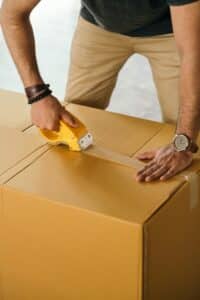
It’s not easy to move. There’s a lot to organize, plan, and coordinate. Timelines are always strict, and assistance can be difficult to come by. It’s important to keep yourself organized with a moving checklist but do remember to put switching banks at the top of your list
If you remain organized, making a bank account transfer is actually very easy. Switching banks, rather than feeling like a chore, can be a positive and even pleasant experience that helps you settle into your new town and community.
Thanks to technological advances that help speed up the application process, you can now open an account with some banks online in minutes.
Switching banks will seem to be a daunting task, but it does not have to be. There could be many banks in town, so start with your local branches and work your way up.
The best banks don’t charge fees, have engaging mobile banking apps, make it simple to contact a bank representative, and have reasonable rates.
Since not all financial institutions are the same, it’s crucial to think about which form of the bank would better serve your needs before switching.
For your banking needs, there are three major types of financial institutions:
Traditional Banks
Not only do big-name banks like Capital One and Wells Fargo have physical locations, but so do your local neighborhood and regional banks. While the convenience of a local branch is certainly appealing to others, the fees and rates charged by these banks are usually higher than those charged by credit unions or online banks.
Credit Unions
Credit unions vary from conventional banks in that they are non-profit organizations run by their members. They function similarly to banks, but they frequently offer lower interest rates and fees than conventional banks.
Online Banks
If you want to do your banking online and don’t mind the lack of local branches, an online bank is a good option. Since these banks avoid the costs of having a physical location, they often pass these savings on to their customers in the form of low fees and competitive interest rates.
In order to better satisfy their financial needs, some people use a variety of banking services. Check to see if your bank has any clear guidance about how to do so.
It will take some time to completely set up your account so that it is ready to use. That’s why it’s a good idea to get a head start on your accounts before you move so they’re ready to go when you arrive.
It’s a good idea to give yourself two weeks to complete the process because, while some banks provide access through mobile apps right away, it can take up to ten days for your new banking documents and debit card to arrive by mail.
Be sure to move all bank account transactions to your new account, such as direct deposits and auto payments, and give yourself a few banking cycles before closing your old one.
Every sign-up procedure is unique. Some banks require you to mail in forms or visit a local branch, while others manage the entire application process electronically.
Many banks today will assist you in easing the pressure of switching banks by providing special transfer services that will make your life simpler. Your new bank will be a huge aid in keeping your finances in order after you pass, from notifying your creditors of new payment information to automatically converting your direct deposits. Furthermore, excellent customer service can be a deciding factor when it comes to selecting a new bank when you relocate.

When you settle on a new home, the sign-up process is a vital part of how to move banks. Although online banks often offer an entirely online sign-up process, credit unions and traditional banks can require you to check your new account in person at a local branch. To verify your identity when opening a new bank account, you usually need to display a government-issued photo ID.
It’s also possible that a minimum deposit will be needed, so double-check your bank’s new account requirements.
Before you can close your old account, make sure all outstanding transactions and direct deposits have been processed.
You will determine the following for your new account by reviewing one year’s worth of statements:
Also, unlink any accounts you may have and clear any safe deposit boxes you may have.
For many people starting their next chapter, the issue of how to turn banks when moving to a new town is a nagging one. Your financial transition is particularly important at a time when so much of your life is in flux. Staying coordinated and educated is crucial when switching banks. Take the time to research the best regional banks and online banks to find the one that is right for you.




